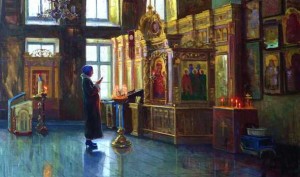 88% of the population professes to believe in God, while the number of agnostics and atheists is constantly dropping: a study examines religion’s comeback in former kingdom of State atheism.
88% of the population professes to believe in God, while the number of agnostics and atheists is constantly dropping: a study examines religion’s comeback in former kingdom of State atheism.
By Alessio Schiesari
The long slog is over. The exile of the Orthodox Church from Russian society began in ’17 with the October Revolution and the birth of “gosateizm”, or State atheism. Ninety five years on, the Patriarchate in Moscow is reliving its youth all over again. A recent survey carried out by the Levada Centre has captured the religious sentiment within the Federation: 79% of Russians profess themselves to be Orthodox, 6% Muslim and 3% are Jews, Catholics and Protestants. Believers as a whole make up 88% of the Russian population. This figure is higher than what it was before the Bolshevik revolution. The number of agnostics is constantly falling (7%), while barely 5% call themselves atheists. Following the fall of the USSR, just 34% of the Russian population called themselves believers. If this figure is compared to today’s, we see that in the past twenty years more than one in two Russians has discovered the faith. The spiritual counter-revolution affects members of the Orthodox faith above all, those who suffered the forced policies of “atheization”. From its very birth, the regime tried to uproot the roots of the Orthodox faith from Russia’s social fabric. The figures help us to understand the extent of the phenomenon: in 1919 there 54 thousand popes (priests?) active in the USSR. Twenty years later, there were just 500 left. Before the accession of the Bolsheviks to power there were a thousand churches in the capital. After the fall of the wall, only 40 remained. Since the fall of the USSR this number has steadily risen and today there are about 500 churches.
Secularisation continued at the same pace, forced along by the five-year plans. The number of Orthodox faithful dropped by 75% in the years before the revolution, plummeting to a meagre 8 – 10% in the 70’s. Everything pointed to religion disappearing definitively. But then a decade later things slowly started to change and the Church took its first timid steps towards recovery. In the 80’s on the occasion of the thousand-year anniversary of the establishment of the Moscow Patriarchate, Gorbacev defined the Church as “a milestone in Russian culture” and called upon believers and atheists “to refound socialism”.
But this joint refoundation never took place because Marxism crumbled just three years later. In the period which succeeded the fall, being part of the Orthodox Church substituted national identity which people had lost touch with. Even among those who claimed to be believers, the acceptance of religious dogma remained a dead letter: paradoxically, many of those who went back to seeing themselves as Christians, continued not to accept the idea of life after death.
Since Vladimir Putin came to power, State and Church ties have been restored, with religion sacralising the nation and the nation protecting religion. The Russian President’s relations with the Patriarchs of the Orthodox Church, first Aleksej II and then Cyril I as of 2009, are excellent, both on a personal and an institutional level. According to the Levada Centre study, 10% of Russians believes that the Orthodox Church is deeply involved in political affairs and 41% believes it is quite involved. Patriarch Kirill I takes enormous care of his relations with State leaders. Last year, in a burst of enthusiasm, the Patriarch defined Putin’s twelve years in power as a “miracle of God.” After the “gosateizm” years, the Russian Orthodox Church and the Kremlin have finally made peace again.

Outstanding. Secular atheism as never a firm foundation for a healthy nation and a vibrant people to stand upon. It never provided a solid basis for a continuing culture. God bless Christian Orthodoxy, though I hope it weans itself from government control a bit, as it may lead them to support some unsavory politicians.
Growing up in the US, I believed the mythology of American goodness. I could not conceive of the collapse of the dreaded enemy (although Solzhenitsyn did). Now I find a world where America exports its crass immorality and military interventions, where the US government violates basic human rights and where Christianity is mocked, scorned by its elites. Thank God I found Orthodoxy. Yes, there are problems in Russia, but the Church is reviving while the pews empty in the West. A president of the United States supports sodomy and abortion. T.S. Eliot’s prophetic poem “the Hollow Men” speaks to this: “this is the way the world ends/Not with a bang but a whimper”.
The Lord is Blessing and will continue to Bless Russia. Here in the USA…things will get worse. We will become like Western Europe and become a God-less nation.
Not while we have anything to do about it. There are many believers of Jesus Christ in America – we will not leave our nation without the Word.
We Americans should take special note of the “Comeback” of Christianity in Russia and learn from their sacrifices as Christians . We Americans are having our own 1917 Revolution like Russia because American atheists and their fellow travelers are continuing to want to overthrow American founding values trying to use our unelected court system to make America “God free”. We must be politically active to counter this assault on American founding values.
The recovery of the faith in Russia is indeed a miracle of God. Even if a former KGB agent previously sworn to be its enemy is the vehicle of that change (e.g., St. Paul pre-Damascus Road).. Bill